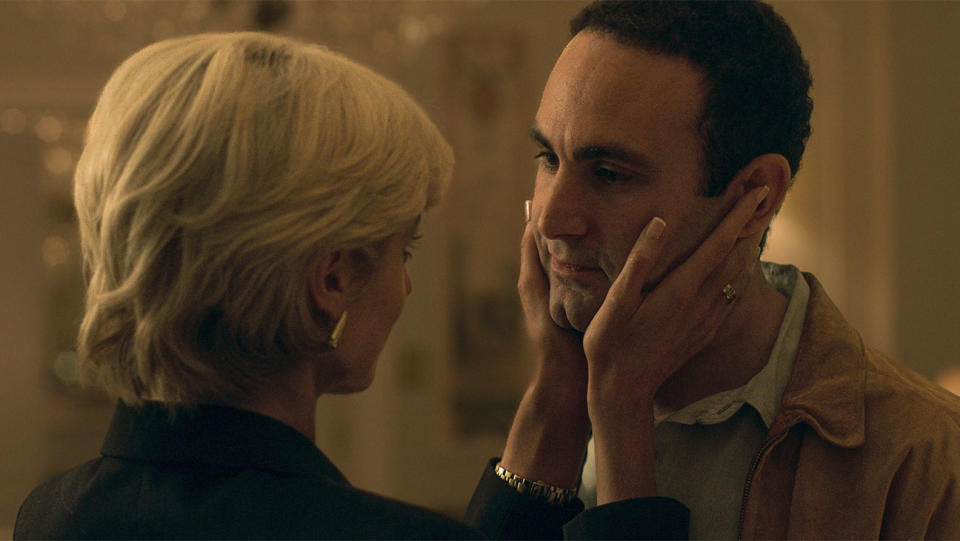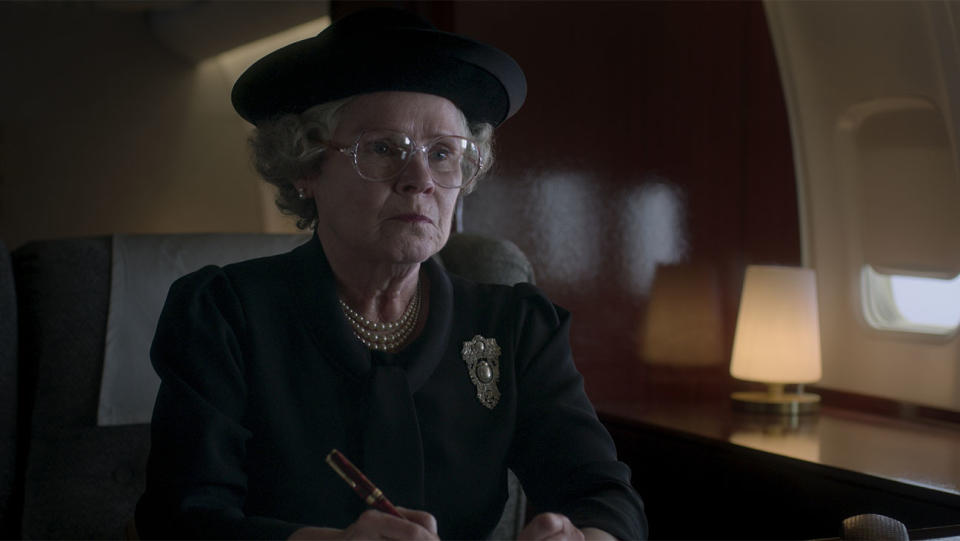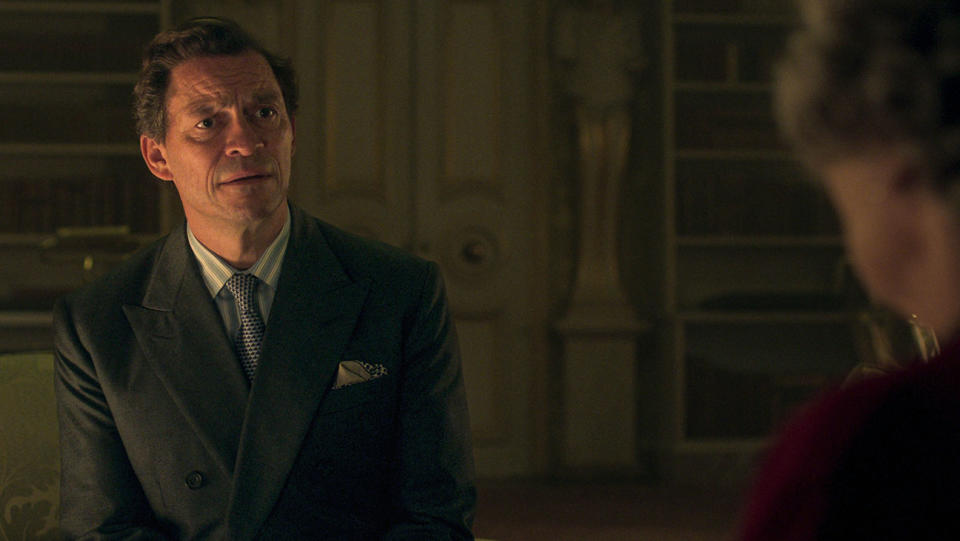‘The Crown’ Sparks Debate Around Retelling of Princess Diana’s Final Days
[This story contains spoilers from part one of season six of The Crown.] The first half of the sixth and final season of Netflix's The Crown delivered an emotional retelling of the time period around Princess Diana's untimely death. More from The Hollywood Reporter
The final season of the hit historical drama has been split into two parts, following a shift in release strategy employed by the streamer on other hit shows like Stranger Things, You and The Witcher. The final season covers the years 1997-2005; however, part one took place solely in 1997, in the two months leading up to and the week after Diana's fatal car crash. (Part two, which releases Dec.
14, will be more expansive to span the remaining years[1].) When asked about the decision to split the final run, executive producer Suzanne Mackie recently told The Hollywood Reporter[2]: It prolongs the buzz around the final episodes, allowed them to transition Prince William and Prince Harry from the younger boys to young men in recasting, and Princess Diana's death gave them the opportunity for "not a big jump in terms of time, but it feels like a big jump emotionally" when the season returns with episode five.
The first four episodes, which made up part one of season six and are now streaming, slowed down to spend time with Diana, Princess of Wales, who has been played by Elizabeth Debicki since season five[3], in the months after finalizing her divorce from Prince Charles (Dominic West, also since season five) and setting out to find her own identity outside of the royal family. As The Crown depicts, she was a powerful advocate (in this example, working to clear landmines around the world) and she shared an overlooked romance with Dodi Fayed (played by Khalid Abdalla)[4], who was killed along with Diana in their fatal car crash in Paris on Aug.
31, 1997. Still, the people she longed to spend more time with were her sons, William and Harry, then 15 and 12, who are played by Rufus Kampa and Fflyn Edwards, respectively, in part one.
Story continues Now, as viewers sit with the first four episodes and await the final six, the retelling of Diana's end-of-life story has left viewers with burning questions about how much of what they saw actually took place. Mainly, did Dodi really propose to Diana, as is depicted in the third episode, "Dis-Moi Oui," on the night before their deaths?
As The Crown tells it, Dodi had an elaborate plan to propose to Diana -- a plan Diana was not privy to and a question she politely turned down. In the third episode, Dodi alters their itinerary to stop in Paris, despite Diana's insistence that she wanted to return to London to be with her sons. Dodi had picked up on Diana eyeing a Dis-Moi Oui ring and, reading into the fact that "Dis-Moi Oui" translates into "tell me yes," the son of Harrods owner Mohamed Al-Fayed (played by Salim Daw in the series) decided to buy the ring and propose.
His intention, as the show depicts, however, was mainly driven by the desire to please his father, who had desperately wanted a match between Dodi and Diana so the Egyptian businessman could be accepted by Britain's royal family. In The Crown, Diana tells William and Harry moments before Dodi's proposal that she has no intention of marrying him -- the boys were asking because the question had been posed feverishly in the tabloid press. When Dodi gets down on one knee, Diana swiftly puts an end to the gesture and lets him down kindly, characterizing them more as a touching summer romance while suggesting he finally gain the courage to step outside of his father's shadow.

Elizabeth Debicki as Princess Diana with Khalid Abdalla as Dodi Fayed in episode three, "Dis-Moi Oui" As they plan to head back to his apartment, according to the series, Dodi decides to evade the mob of paparazzi waiting for them outside of The Ritz hotel, which his family owned, by enlisting a solo driver, chauffeur Henri Paul -- who, unknown to them, had been drinking at the bar before getting behind the wheel -- and, with no security, leaving the hotel by the back entrance. (Paul reportedly[5] had "three times the French legal limit of alcohol in his blood" and was eventually blamed for the crash.) The episode then briefly recreates the tragic accident, as an onlooker watches their car head into the Pont de l'Alma underpass (reportedly at around 60 mph) to the sound of a crash, with several trailing paparazzi on motorbikes jolting to a stop. The final scene between Diana and Dodi was recreated from CCTV footage at the back of The Ritz. Abdalla told The Hollywood Reporter[6] that the seven-minute video of the pair holding hands behind their backs was one of the things that "tethered" him in relation to Diana. "There was a tenderness.
There was a falling in love of some kind," he said. Debicki added,[7] "There was also a real sense of someone who's going to listen to you -- and that, to me, felt absolutely crucial for the character at that point in her life. That sense of support and being seen was key. And it was really important for us to create that sense for the audience, too, so that when they head into this pressure cooker of turmoil, you know that they've had this time together and they understand each other and care for each other."
After their deaths in real life, Mohamed claimed the pair had been engaged and targeted in their deaths; which was not supported by any facts or by the royal family. Creator Peter Morgan appears to have gone with Mohamed's version around a proposal (but not an engagement) -- perhaps in an effort to show the audience what could have become of the couple. There has been much speculation around the ring and even though the British inquest into Diana's death 10 years later concluded that Dodi did indeed purchase the ring from the Paris jewelry store, there was no indication he ever proposed with it.
The Operation Paget Inquiry Report[8], which was instigated at Mohamed's behest, quoted several people closest to Diana, who claimed there was "no mention whatsoever of an engagement, nothing to even suggest she might be expecting a proposal, not for a split second." As Mackie tells it, every plot point on The Crown is thoroughly researched, fact-checked and deliberate. "Sometimes, if we felt there was a need to dramatize something," she said[9], "then we'd make a very conscious collective decision that that decision was being made. Sometimes when we're accused of making mistakes, we all feel very defensive about that because they're not mistakes, they're decisions.
They're creative decisions and nothing would ever be casually decided upon. It would all be very, very carefully considered. We're hawkish about the truth, but also there's a spirit of truth, and there's accuracy, and you have to weigh it out very carefully as a team and make decisions."

Imelda Staunton as Queen Elizabeth And, how did the Queen (played by Imelda Staunton in season six of The Crown) respond to Diana's death? Controversially, the British monarch waited five days at Balmoral Castle in Scotland with her grandsons and family before publicly addressing a grieving nation after Diana's death, eventually doing so in a well-received televised address that was painstakingly recreated in episode four, "Aftermath." (Watch the actual address here[10].)
Behind the scenes, The Crown shows Elizabeth at first disagreeing with her son Charles (West) about how the family is expected to grieve Diana, with both her and Prince Philip (Jonathan Pryce) pushing back on his insistence that the royal protocol should be applied to Diana, who is no longer a member of the family since the divorce. In the series, Charles insists that the mother of the future King of England get the royal treatment, including transportation to bring her body back from Paris; when the Queen bristles at the idea, he asks if she prefer she be brought back "in a Harrods van." Charles also pushes for a royal funeral, insisting that the family cannot pick and choose when to be public and when to be private, which resulted in the princes walking behind the casket (along with Prince Philip, Prince Charles and Diana's brother, Charles Spencer) in an unforgettably televised moment they have each spoken out about since, including in Harry's memoir Spare.
The Queen's ultimate attendance at Diana's funeral, Sept.
6, 1997, at Westminster Abbey in London, in which she bowed at Diana's casket, was well received by the public.[11][12] Since Charles hasn't spoken out about their private conversations, fact-checking The Crown's "Aftermath" depictions of the Queen's mindset in the days after Diana's death is a tall order. As THR's chief TV critic Daniel Fienberg predicted in his review[13], airing this four-episode arc with a pause before the rest of the season "now gives the British press and various royalist fact-checkers a month to rend garments and gnash teeth."

Prince Charles (West) speaking to the Queen (Staunton) in fourth episode of season six, "Aftermath" While Buckingham Palace also has not spoken out, the Queen's former press secretary Dickie Arbiter, who was her spokesman from 1998 to 2000, has taken issue with some of the specifics included in the fourth episode. "The scenes between Charles and his mother, in which he blurted out that she wanted Diana to come back in a Harrods van were absolute nonsense. It just didn't happen like that.
Of course an aircraft was going to be made available. The Queen was the first one to agree to that," he told Deadline. He also said that Diana's brother, Charles Spencer, was the one who insisted on a public funeral: "Spencer thought that because Diana was a public figure, because she was very popular and people adored her, that it should be something handled by the royal family to make it a public event rather than a private family event."
Spencer publicly supported that stance at the time, saying in 1997[14] that the Spencer family and the royal family were "united in the aim of giving Diana a suitable funeral." Adding, "To suggest that there were divisions between royal officials and me in the period after my sister's death is so far from the truth as to be laughable." The Palace even considered restoring Diana her designation of Her Royal Highness after the funeral, but the Spencer family turned the offer down, saying that would not have been Diana's wishes. Part two of The Crown releases Dec.
14 on Netflix.
Best of The Hollywood Reporter
References
- ^ span the remaining years (www.hollywoodreporter.com)
- ^ Suzanne Mackie recently told The Hollywood Reporter (www.hollywoodreporter.com)
- ^ played by Elizabeth Debicki since season five (www.hollywoodreporter.com)
- ^ overlooked romance with Dodi Fayed (played by Khalid Abdalla) (www.hollywoodreporter.com)
- ^ reportedly (www.nbcnews.com)
- ^ Abdalla told The Hollywood Reporter (www.hollywoodreporter.com)
- ^ Debicki added, (www.hollywoodreporter.com)
- ^ Operation Paget Inquiry Report (downloads.bbc.co.uk)
- ^ she said (www.hollywoodreporter.com)
- ^ here (www.youtube.com)
- ^ Harry's memoir Spare (www.hollywoodreporter.com)
- ^ was well received by the public. (www.washingtonpost.com)
- ^ THR's chief TV critic Daniel Fienberg predicted in his review (www.hollywoodreporter.com)
- ^ saying in 1997 (edition.cnn.com)
